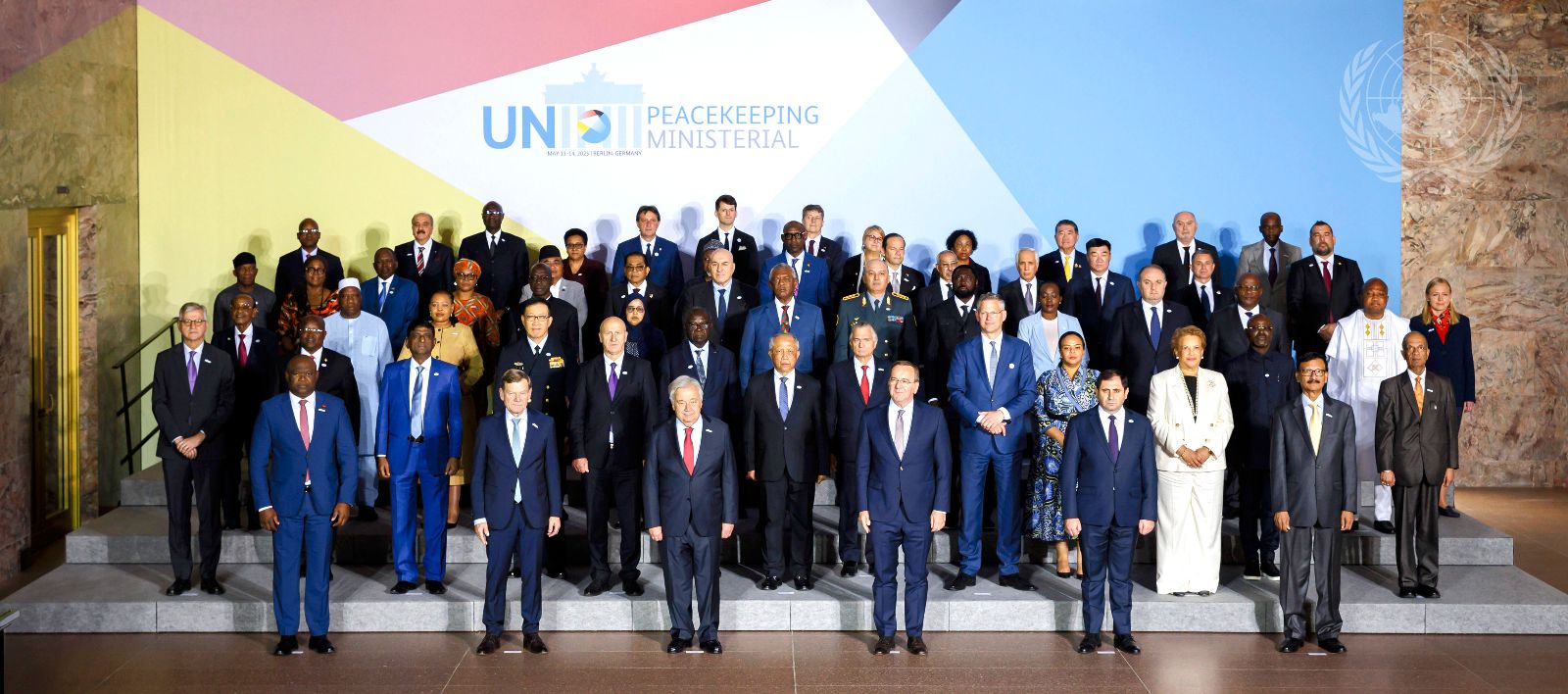This year, the United Nations (UN) celebrates 80 years of trying to create a safer and more stable world. In reflecting on this grand milestone at the recent UN Peacekeeping Ministerial, UN Secretary-General (UNSG), Antonio Guterres, noted that the UN is operating at a time when it is facing the highest number of conflicts since it was founded. The complexities around managing this conflict landscape are compounded by several factors including an increasingly crowded theatre of war which proffers militarised solutions over political ones, and ongoing humanitarian crises whose social and economic repercussions will persist long after the fighting ceases. How can UN Peacekeeping adapt to this conflict context?
This year’s Peacekeeping Ministerial, hosted by the Federal Republic of Germany ahead of the UNSG’s review on peace operations, brought together 45 Ministers, key experts and various regional organisations. The meeting outlined a number of priorities against the backdrop of this challenging operational environment. In particular, there were calls for more agile and adaptable operations, featuring tailored mandates, clearly defined transition and exit strategies, an emphasis on local ownership and broader burden-sharing among all member states – all in the context of major funding challenges which have been a long time coming. In April this year, Reuters reported that the UN’s largest funder, the United States of America (US), had discussed funding cuts for peacekeeping missions. The most recent example being the US’ refusal to support the African Union Support and Stabilisation Mission in Somalia (AUSSOM). The liquidity crisis is further exacerbated by the arrears owed by many member states (including the US) which have contributed to US$1.5 billion in unpaid regular budget assessments, the highest level in four years.
In the African context, an issue that the future of UN peacekeeping will have to consider in its operational environment is the increased use of regional operations such as the Alliance of Sahel States, the Accra Initiative, Multinational Joint Task Force (MNJTF), the now defunct G-5 Sahel Joint Force and the Regional Initiative for the Elimination of the Lord’s Resistance Army, as well as peace enforcement operations from the Southern African Development Community in Mozambique and the Democratic Republic of the Congo. Articles 52 and 53 of the UN Charter provide for the involvement of regional arrangements in conflict management and enforcement action. However, one criticism raised during the Ministerial’s breakout sessions was that regional operations, by virtue of operating ‘outside the UN framework,’ do not necessarily adhere to the same norms and values and cannot replace the standards established by the UN. Arguments were also made against romanticising the term ‘comparative advantage’ to justify regional approaches. This begs the question of what kind of ‘regionalism’ is permissible within the UN system? It is clear that there is a need for deeper reflection on these regional operations and how it relates to the language of the Charter but also the priorities and interests in the respective contexts.
Arguments were also made against romanticising the term ‘comparative advantage’ to justify regional approaches. This begs the question of what kind of ‘regionalism’ is permissible within the UN system?
Tweet
Such challenges will be difficult to navigate but they offer important entry points for change and in particular, some kind of reform of the multilateral architecture.
A key topic of the Ministerial focused on increased partnerships and burden-sharing among member states. While this was presented as ‘low hanging fruit’ that can be used to promote better prepared missions and navigate the various resource constrained operational environments, the rhetoric of ‘partnerships’ cannot be used to manage the crux of the crisis within the multilateral system, and the UN in particular. In the context of the UN Security Council (UNSC), this ‘crisis’ has been characterised by increasingly fragmented approaches to ending conflicts and a mixed record of member states’ commitment to the rights-based norms and values of the UN system. However, when understood alongside the historical formation of the UN system (and its League of Nations predecessor), the unravelling of the ‘shared’ universality which underpins it, is not surprising. In the 80 years since it was founded, the UNSC still lacks permanent African representation even though the continent has hosted the largest number of peacekeeping operations. The current challenges within the multilateral system are a manifestation of a system that, at its core, is defined by a version of universality that has yet to represent the interests and needs of the majority of its member states. The varying roles that the P5 members play in ongoing conflicts across the world also does not inspire any confidence. Discussions on how to adapt peacekeeping to this complex operational environment has to be rooted in a larger discussion on reform and the historical formation and political interests which continue to define how the UN works. Hypothetically, more inclusive and representative decision-making within the UNSC could help to garner the political and diplomatic support needed to address some of the challenges related to burden-sharing.
In the 80 years since it was founded, the UNSC still lacks permanent African representation even though the continent has hosted the largest number of peacekeeping operations
Tweet
Andrea Prah (PhD) is a Senior Researcher at ACCORD.


